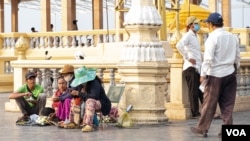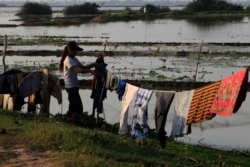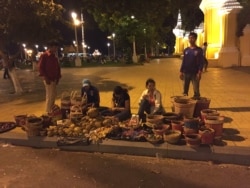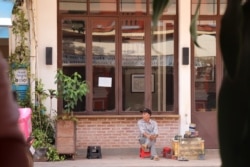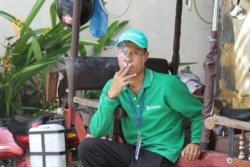The draft Law on Public Order accessed by VOA Khmer will likely regulate and criminalize public behavior and business activity, rights activists said Tuesday, by targeting the actions of the poorer sections of society and working classes.
The wide-ranging law, drafted by the Interior Ministry, will give authoritative control to officials, all the way down to the commune council, to regulate Cambodians’ behavior and activities in public spaces, through several prohibitions that can be enforced by vaguely defined and discretionary powers.
The draft law deals with multiple aspects of the community, such as the aesthetic look of public spaces, how much noise people can make, and the Ministry of Interior’s interpretation of national tradition and people’s dignity.
“This law aims to ensure public order management by maintaining order, aesthetic value, sanitation, cleanliness of the environment, quietness, social stability, preservation of national tradition, and the dignity of citizens,” reads Article 1 of the draft law.
The law has the potential to affect Cambodians’ right to free expression and assembly, rights activists said, while likely discriminating against multiple groups of people.
Ouk Kimlekh, secretary of state at the Interior Ministry, confirmed the authenticity of the draft law obtained by VOA Khmer last week, confirming that the latest draft was completed on June 16, 2020.
The Ministry official, who led the drafting process, defended the need to create a “civilized and modern” Cambodian state, adding that the government needed to direct these changes.
“All of us understand that our country is getting more peaceful and gradually more orderly and that society needs orderliness and appropriateness,” Ouk Kimlekh said. “This is an arrangement of orders to get our country as civilized and developed as the other countries.”
In the first sections of the law, which contains eight chapters and 48 articles, clauses are unclear about which national and subnational authorities can enforce this law, adjudicate on potential violations, and collect fines or destroy materials deemed to affect public order.
Officials can immediately place a transaction or administrative penalty on violators of the law, with courts deciding on fines and imprisonment. People can be jailed for up to six days and fined up to around $125.
In the chapter dealing with “aesthetic value,” the draft law prohibits 12 activities, including the drying or hanging of clothes “which can be seen in public,” fixing and selling of machinery and vehicles on the pavement and selling products on the roadside.
These activities are routinely seen across Cambodian cities, towns, and villages, given the lack of land zoning, cramped living spaces, and challenging living standards faced by the working classes.
It is also common to see Cambodians selling food and drinks from orange ice boxes, where most of these people are part of the informal economy. Several neighborhood laundry services and Cambodian households also dry their clothes outside their establishments.
The draft, for now, criminalizes the poor and those experiencing homelessness, by prohibiting “all forms of begging” and the use of “public spaces such as parks and roads as temporary shelters.” According to the draft, these two prohibitory acts are to ensure the “aesthetic value” and “national tradition and dignity” of Cambodia, respectively.
At the same time, it discriminates against people with mental illness by preventing them from walking freely in public without a caregiver or guardian. Article 3 of the draft vaguely defines a mental disorder as a “mental change that results in the loss of self-control to determine right and wrong.”
The law could restrict freedom of expression by disallowing “cursing and insulting on social media” and prevents the creation of paintings, signs, and posters with content that “affects public order and aesthetic value.”
Authorities will be given the power to prevent fundraising in public and conducting weddings, religious events, and “other ceremonies,” with little clarification given to define the last restriction.
Additionally, Article 31 allows “competent authority” to refuse or stop any event in case it causes “disturbance” or a “threat” to the public or causes a “critical impact on relations between different groups of people,” with this likely affecting freedom of assembly and peaceful demonstration.
The Interior Ministry’s Ouk Kimlekh said that the draft law would not supersede existing laws allowing for public gatherings, such as the Law on Peaceful Demonstrations, which has been used in the past to prevent civil society events, protests, and demonstrations.
Ouk Kimlekh also defended a section in the draft that polices the clothing worn by Cambodians, specifically preventing women from wearing clothing that is “too” short or see-through.
“We take care of the public order and this law is aimed at protecting the order, traditions, and customs, meaning that we will prohibit activities that go against the traditions too much,” he said.
While the law does propose safety signage in public areas, food safety guidelines, a drinking age, reduction of industrial pollution, a public smoking ban, all these clauses are loosely defined and, in some cases, point to existing legislation.
But, these articles are mixed with other restrictions on behaviors described in the draft as “speaking loudly,” “behaving arrogantly,” “causing trouble,” “fighting” and “cursing.”
The penultimate article of the draft law states that the authorities will begin implementation of the legislation one year after its promulgation.
Chak Sopheap, executive director at the Cambodian Center for Human Rights, said the vague definitions found in the draft law provides room for local authorities to use the legislation to issue “orders” that prevent protests and peaceful assembly.
“We have observed in the past that authorities have often cited the reason of restoring order to restrict activities, including peaceful assembly,” Chak Sopheap said.
It was critical to assess the government’s intentions with this legislation, she said, adding that it could be used for public benefit or as a means to place further restrictions.
“We will take part in checking the characteristics of this law by providing relevant recommendations to ensure that the law shall not affect or violate the principles of honoring human rights – especially the rights to free expression and assembly,” she said.
Vorn Pov, president of Independent Democracy of Informal Economy Association, said he had not read the proposed legislation, but if the law were to be passed it could affect several informal workers, like street vendors, and even people experiencing homelessness.
“We are also worried that this could enable some corrupt officials to extort bribes from street vendors,” he added.
He was concerned the government would disregard concerns raised by civil society groups, and that the law would be passed as is.
Chan Ponleu, who sells beverages on the street side in Daun Penh district, said he would have no option but to follow the authorities’ instructions.
“If they order us to leave, we will leave. If they allow us to stay, we stay,” he said. “It’s impossible to even think that we can resist their power. It’s impossible.”




